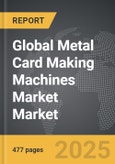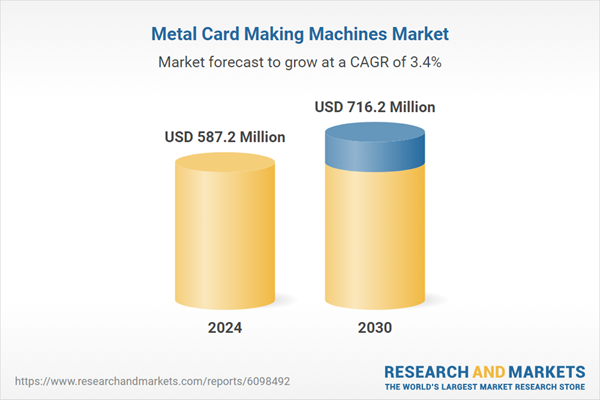Global Metal Card Making Machines Market - Key Trends & Drivers Summarized
Why Are Metal Card Making Machines Gaining Popularity in Premium and Secure Identification Applications?
Metal card making machines have emerged as specialized industrial equipment designed to manufacture high-quality, durable, and secure cards made from stainless steel, aluminum, copper, and other metallic substrates. Originally popularized in the luxury payment card segment, metal cards are now gaining wider adoption in areas such as corporate identity, VIP access, commemorative cards, and government-issued credentials due to their physical robustness, aesthetic appeal, and tamper resistance. The machines used for their production are sophisticated systems that integrate cutting, embossing, engraving, thermal printing, lamination, chip embedding, and personalization functions tailored to metal substrates.Unlike plastic card production lines, which operate at higher speeds and volumes, metal card making machines prioritize precision, durability, and intricate detailing. Their ability to handle metallic materials with micro-level accuracy has positioned them as essential tools in sectors demanding visual distinction, security, and brand value enhancement. As contactless payment infrastructure expands and demand for high-end personalization increases, businesses are turning to metal cards as both functional tools and brand statements, thereby driving interest in advanced manufacturing systems tailored for this niche.
How Are Machine Technologies Evolving to Deliver Higher Precision, Throughput, and Integration?
The evolution of metal card making machines is marked by significant advancements in CNC milling, fiber laser engraving, robotic arm automation, and multi-layer lamination capabilities. Modern systems offer sub-millimeter cutting tolerances and support for complex patterns, dual-material integration, and secure chip/antenna embedding compatible with EMV, RFID, and NFC standards. High-end engraving modules now incorporate 3D laser sculpting, enabling variable texturing, holographic finishes, and dual-tone coloring on stainless steel or titanium surfaces.In addition to traditional embossing and screen-printing functions, machines are now equipped with UV inkjet personalization modules and digital die-cutting tools. IoT integration and SCADA-based dashboards enable real-time monitoring of error rates, material consumption, and maintenance schedules. Furthermore, modular configurations are becoming more prevalent - allowing manufacturers to scale machine capabilities depending on card volume, material diversity, and design complexity. These developments are particularly relevant for card issuers, OEMs, and secure printing service providers seeking compact, efficient, and high-value production lines.
Which End-User Segments and Geographies Are Fueling Demand for Metal Card Manufacturing Systems?
The leading end-user segments for metal card making machines include financial institutions, fintech startups, card personalization bureaus, high-end loyalty programs, and governments involved in secure ID issuance. Banks and payment service providers are driving the premiumization of debit and credit card portfolios by offering stainless steel and composite metal cards to affluent customers. In parallel, luxury brands and corporate gifting firms are utilizing metal cards for membership, recognition, and promotional campaigns, further diversifying market demand.Geographically, North America and Europe dominate machine installations due to early adoption of luxury metal cards by banks and fintechs such as American Express, Apple Card (Goldman Sachs), and Revolut. Asia-Pacific is seeing accelerated growth, particularly in China, South Korea, and India, where a growing upper-middle class is creating a market for premium financial products and VIP services. The Middle East, with its strong demand for high-end personalization in banking and tourism, is also emerging as a lucrative region for metal card manufacturing systems.
What Is Driving Long-Term Growth in the Metal Card Making Machines Market?
The growth in the global metal card making machines market is driven by converging trends in personalization, physical card differentiation, and secure credentialing. As digital banking platforms proliferate, physical cards are increasingly viewed as premium extensions of brand identity, offering tangible touchpoints that reinforce customer loyalty. Metal cards cater to this strategic positioning while also offering improved durability, which reduces replacement frequency and long-term cost for institutions.The rise of fintech companies and neobanks offering customized financial products has created a new customer base seeking hardware-enabled distinction. Simultaneously, advancements in machine modularity, software integration, and tooling versatility are making it feasible for mid-sized card service providers to enter the metal card segment without large-scale capital expenditure. Regulatory attention to security and chip authentication is further encouraging the shift to metal-based secure ID formats, particularly in border control, e-residency, and defense identity systems.
As the line between functionality and brand experience blurs in card issuance, demand for high-precision, flexible, and automated metal card making machines will continue to grow - shaping the next chapter of secure and premium identity infrastructure.
Report Scope
The report analyzes the Metal Card Making Machines market, presented in terms of market value (US$). The analysis covers the key segments and geographic regions outlined below:- Segments: Machine Type (Embossing Machine, Engraving Machine, Cutting Metal Machine, Personalization Machine); Fed Type (Sheet-fed Metal Card Making Machine, Coil-fed Metal Card Making Machine); Control Mechanism (Manual Control Machine, Semi-automatic Control Machine, Fully Automatic Control Machine); Power Source (Electric Powered Metal Card Making Machine, Hydraulic Powered Metal Card Making Machine, Pneumatic Powered Metal Card Making Machine).
- Geographic Regions/Countries: World; United States; Canada; Japan; China; Europe (France; Germany; Italy; United Kingdom; Spain; Russia; and Rest of Europe); Asia-Pacific (Australia; India; South Korea; and Rest of Asia-Pacific); Latin America (Argentina; Brazil; Mexico; and Rest of Latin America); Middle East (Iran; Israel; Saudi Arabia; United Arab Emirates; and Rest of Middle East); and Africa.
Key Insights:
- Market Growth: Understand the significant growth trajectory of the Embossing Machine segment, which is expected to reach US$382 Million by 2030 with a CAGR of a 4.4%. The Engraving Machine segment is also set to grow at 2.1% CAGR over the analysis period.
- Regional Analysis: Gain insights into the U.S. market, valued at $160 Million in 2024, and China, forecasted to grow at an impressive 6.5% CAGR to reach $143.8 Million by 2030. Discover growth trends in other key regions, including Japan, Canada, Germany, and the Asia-Pacific.
Why You Should Buy This Report:
- Detailed Market Analysis: Access a thorough analysis of the Global Metal Card Making Machines Market, covering all major geographic regions and market segments.
- Competitive Insights: Get an overview of the competitive landscape, including the market presence of major players across different geographies.
- Future Trends and Drivers: Understand the key trends and drivers shaping the future of the Global Metal Card Making Machines Market.
- Actionable Insights: Benefit from actionable insights that can help you identify new revenue opportunities and make strategic business decisions.
Key Questions Answered:
- How is the Global Metal Card Making Machines Market expected to evolve by 2030?
- What are the main drivers and restraints affecting the market?
- Which market segments will grow the most over the forecast period?
- How will market shares for different regions and segments change by 2030?
- Who are the leading players in the market, and what are their prospects?
Report Features:
- Comprehensive Market Data: Independent analysis of annual sales and market forecasts in US$ Million from 2024 to 2030.
- In-Depth Regional Analysis: Detailed insights into key markets, including the U.S., China, Japan, Canada, Europe, Asia-Pacific, Latin America, Middle East, and Africa.
- Company Profiles: Coverage of players such as Abeona Therapeutics Inc., AGTC (Applied Genetic Technologies), Amicus Therapeutics, ArmaGen Inc., Asklepios BioPharmaceutical and more.
- Complimentary Updates: Receive free report updates for one year to keep you informed of the latest market developments.
Some of the 48 companies featured in this Metal Card Making Machines market report include:
- Addograph Distributors, Inc.
- Alibaba Group
- Ascot Engg Products
- Atlantic Zeiser GmbH
- Cancard Inc.
- Card Data Systems
- Card Imaging Master (CIM)
- Card Maker
- Entrust Corporation
- Evolis
- HeatSign
- Higgins Corporation
- IdentiSys Inc.
- Jin Guan Tech (Shenzhen) Co., Ltd.
- Liaocheng Wayne New Materials Co., Ltd.
- Matica Technologies AG
- PIOTEC
- Shenzhen Wentong Machinery Co., Ltd.
- Stuart Stamp & Engraving
- Zhengzhou Allraise Company Ltd.
This edition integrates the latest global trade and economic shifts into comprehensive market analysis. Key updates include:
- Tariff and Trade Impact: Insights into global tariff negotiations across 180+ countries, with analysis of supply chain turbulence, sourcing disruptions, and geographic realignment. Special focus on 2025 as a pivotal year for trade tensions, including updated perspectives on the Trump-era tariffs.
- Adjusted Forecasts and Analytics: Revised global and regional market forecasts through 2030, incorporating tariff effects, economic uncertainty, and structural changes in globalization. Includes historical analysis from 2015 to 2023.
- Strategic Market Dynamics: Evaluation of revised market prospects, regional outlooks, and key economic indicators such as population and urbanization trends.
- Innovation & Technology Trends: Latest developments in product and process innovation, emerging technologies, and key industry drivers shaping the competitive landscape.
- Competitive Intelligence: Updated global market share estimates for 2025, competitive positioning of major players (Strong/Active/Niche/Trivial), and refined focus on leading global brands and core players.
- Expert Insight & Commentary: Strategic analysis from economists, trade experts, and domain specialists to contextualize market shifts and identify emerging opportunities.
Table of Contents
Companies Mentioned (Partial List)
A selection of companies mentioned in this report includes, but is not limited to:
- Addograph Distributors, Inc.
- Alibaba Group
- Ascot Engg Products
- Atlantic Zeiser GmbH
- Cancard Inc.
- Card Data Systems
- Card Imaging Master (CIM)
- Card Maker
- Entrust Corporation
- Evolis
- HeatSign
- Higgins Corporation
- IdentiSys Inc.
- Jin Guan Tech (Shenzhen) Co., Ltd.
- Liaocheng Wayne New Materials Co., Ltd.
- Matica Technologies AG
- PIOTEC
- Shenzhen Wentong Machinery Co., Ltd.
- Stuart Stamp & Engraving
- Zhengzhou Allraise Company Ltd.
Table Information
| Report Attribute | Details |
|---|---|
| No. of Pages | 477 |
| Published | February 2026 |
| Forecast Period | 2024 - 2030 |
| Estimated Market Value ( USD | $ 587.2 Million |
| Forecasted Market Value ( USD | $ 716.2 Million |
| Compound Annual Growth Rate | 3.4% |
| Regions Covered | Global |









